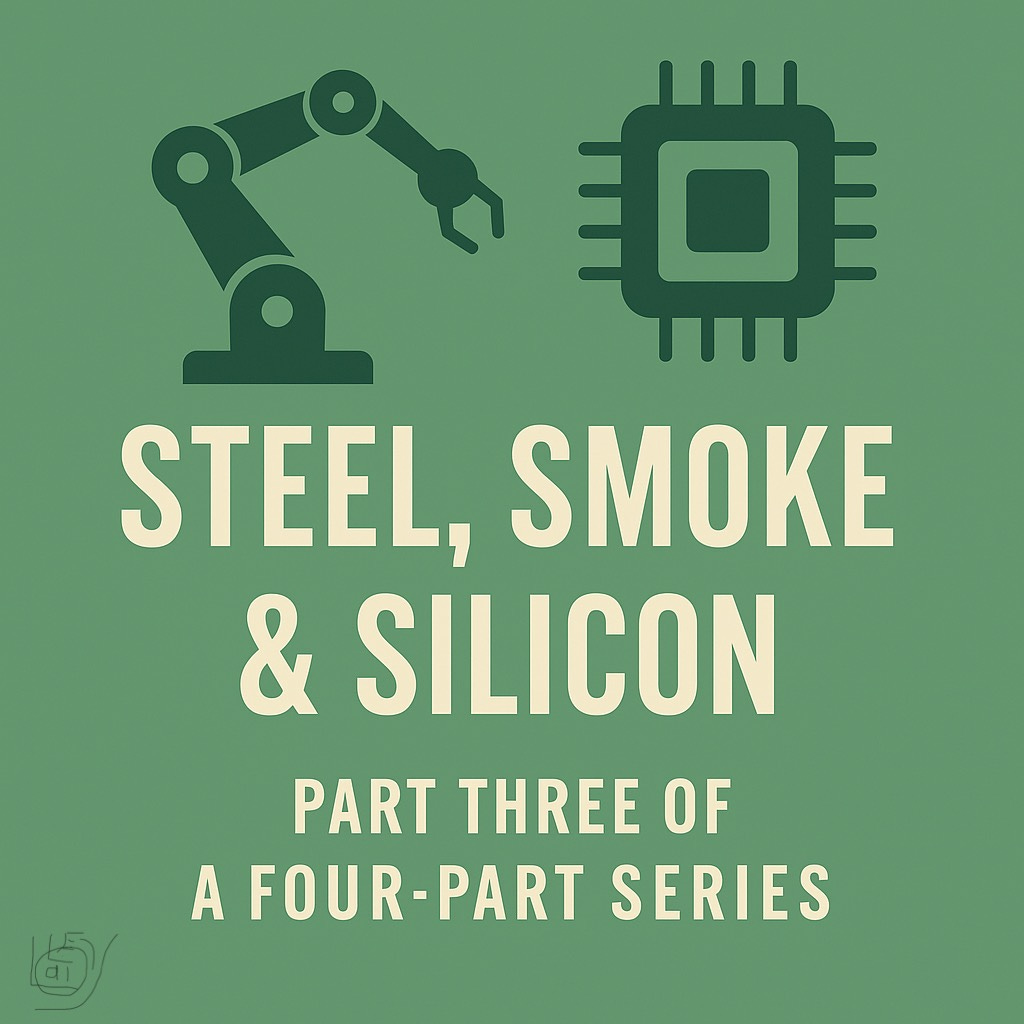Steel, Smoke and Silicone - Steel Meets Silicon: The Promise and Peril of AI
Part Three of a Four-Part Feature on the Past, Present and Future of British Manufacturing
Tomorrow’s Tools in Today’s Hands
Artificial Intelligence is not just coming. It is already here.
Not in the form of sentient robots or science fiction fantasies, but as an invisible force reshaping how we work, live and make. From the boardroom to the factory floor, AI is becoming the next great industrial tool. Quietly. Relentlessly. Irreversibly.
For British manufacturing, this is the new frontier.
And if we get it right, it could be our redemption.
What AI Is and What It Isn’t
Let us get one thing straight. What we call Artificial Intelligence today is not intelligence in the true sense.
It does not think. It does not imagine.
It does not understand.
What it does is something else entirely. It analyses patterns across vast oceans of data. It predicts outcomes. It makes connections. It learns to optimise. That is not intelligence as we know it. But it is a form of power. And in the right hands, it can transform how we make things.
On the factory floor, AI is already being used for predictive maintenance, supply chain forecasting, quality control and smart scheduling.
It spots faults before they happen.
It saves time, materials and money.
This is not about replacing brains. It is about extending them.
The Skills Race
The danger is not in the machine. It is in our ability to keep up.
We will not lose this race because AI moved too fast.
We will lose it if we fail to train people fast enough.
Data literacy. Coding. Machine integration. These are no longer specialist skills. They are the new basics. Knowing how to weld, how to wire, how to assemble, these are still vital. But we must now add how to read a dashboard, how to work with algorithms, how to bridge physical and digital.
If we do not build that skill base now, we will not just be importing products.
We will be importing ideas.
And losing influence with every shipment.
Design Gets Supercharged
In design, AI is a game-changer.
It can take a concept and turn it into a prototype within minutes. It can run simulations on stress, friction, airflow, temperature, and suggest improvements before a single part is made. This flattens the barriers between vision and production.
For a country like Britain, bursting with creativity, design talent and heritage, this is gold dust. AI can amplify what we already do best.
It does not replace design.
It accelerates it.
A Word of Caution: Ethics and Oversight
But with power comes peril.
AI must remain a tool. A servant. A function of human intention.
It cannot be allowed to dictate strategy, values or purpose.
We cannot allow black-box algorithms to determine what gets built, who gets employed or how corners are cut in the name of speed. The industrial world is already fragile in trust. People want accountability. They want to know who is making decisions, and why.
If we hand that power to hidden software, we risk turning manufacturing into a realm of invisible rulers and unreachable errors.
Ethics in AI is not optional.
It is structural.
Opportunities for the Bold
Britain has something rare. A wealth of AI expertise.
In our universities. In our start-ups. In our labs.
And yet the link between that talent and our manufacturing base is often thin or non-existent. We have engineers with ideas and manufacturers with problems, and too few bridges in between.
But where connections do happen, we see the future.
Factories that learn.
Supply chains that self-correct.
Products that adapt to the user in real time.
This is the cutting edge. And it is within our reach, if we choose to grab it.
A National Conversation
We cannot leave this to chance.
AI in manufacturing is not a footnote.
It is not a side project for the tech crowd.
It must be front and centre of national strategy.
Germany is already moving.
Korea is embedding it at every level.
China is throwing scale, cash and ambition at the problem.
If we hesitate, we will fall behind.
If we delay, we will become a museum.
But if we act, and act boldly, we can become a beacon.
Next: Making It All Real
So what now? How do we turn vision into steel?
What kind of policy, what kind of leadership, what kind of long-term commitment does it take to build a nation that truly makes again?
In Part Four, we will look at what needs to happen. Not theory. Not slogans. But hard ground. The framework, the investment and the courage to build factories filled with light, not smoke.
Because the future is not being written in the clouds.
It is being made on the shop floor.



